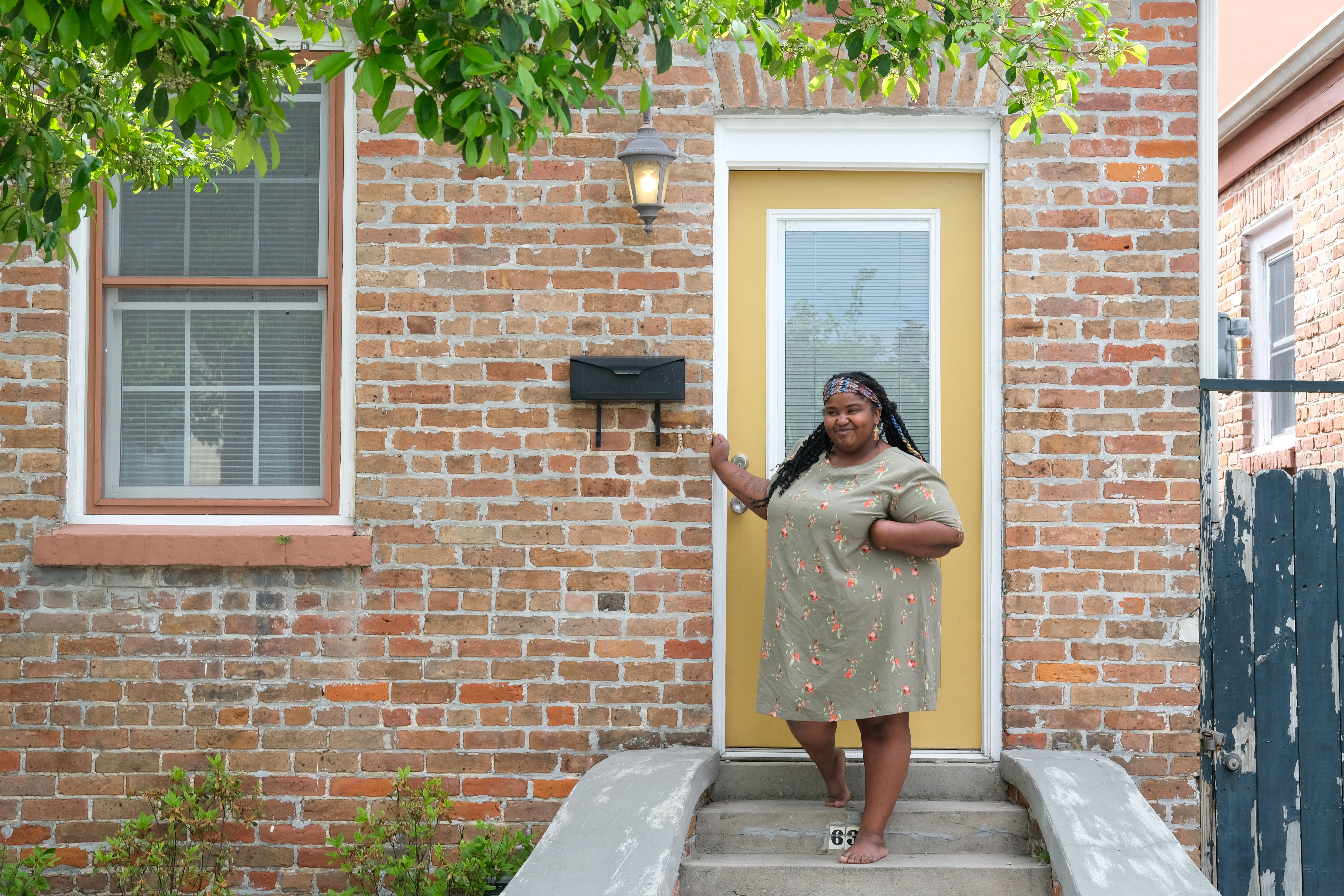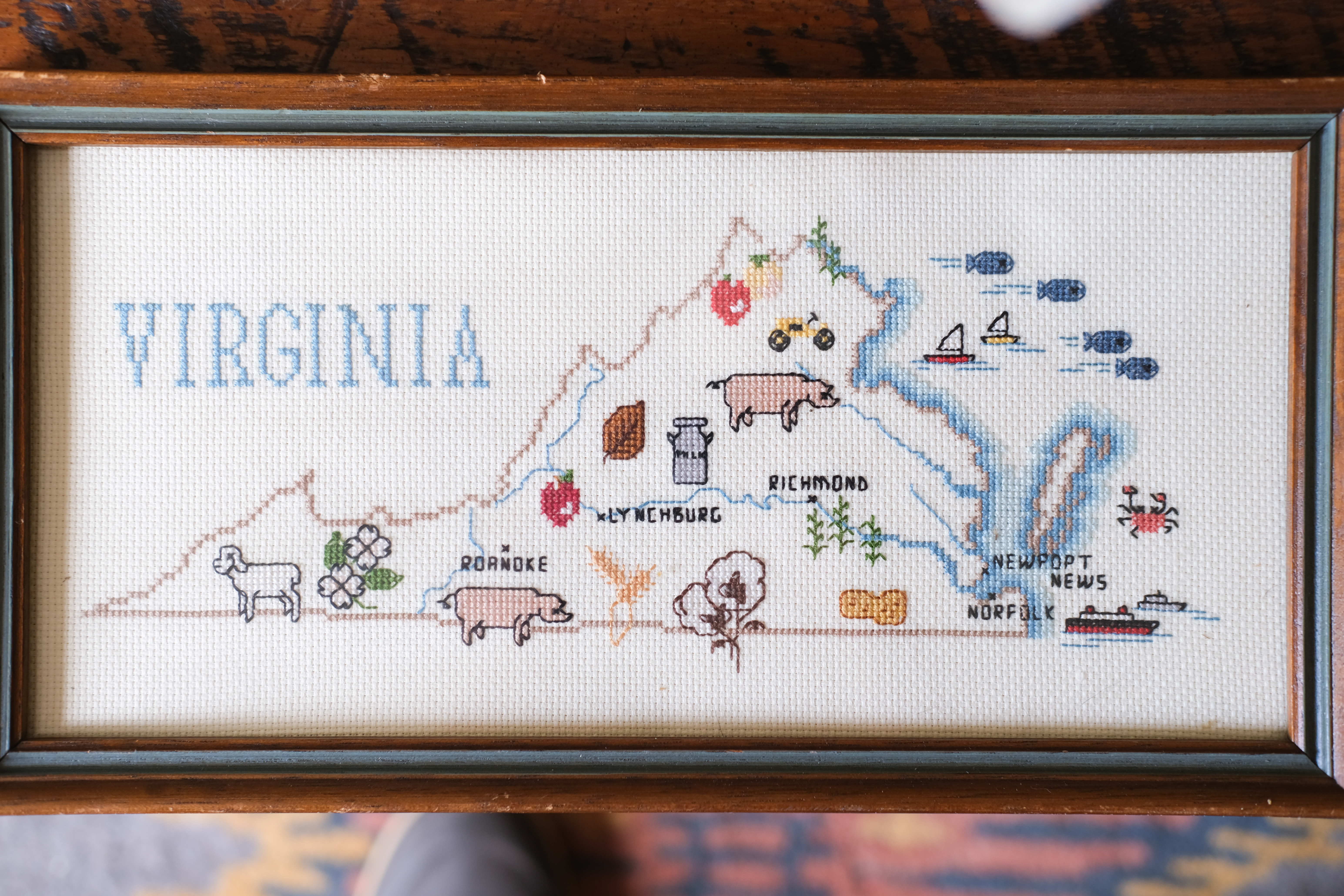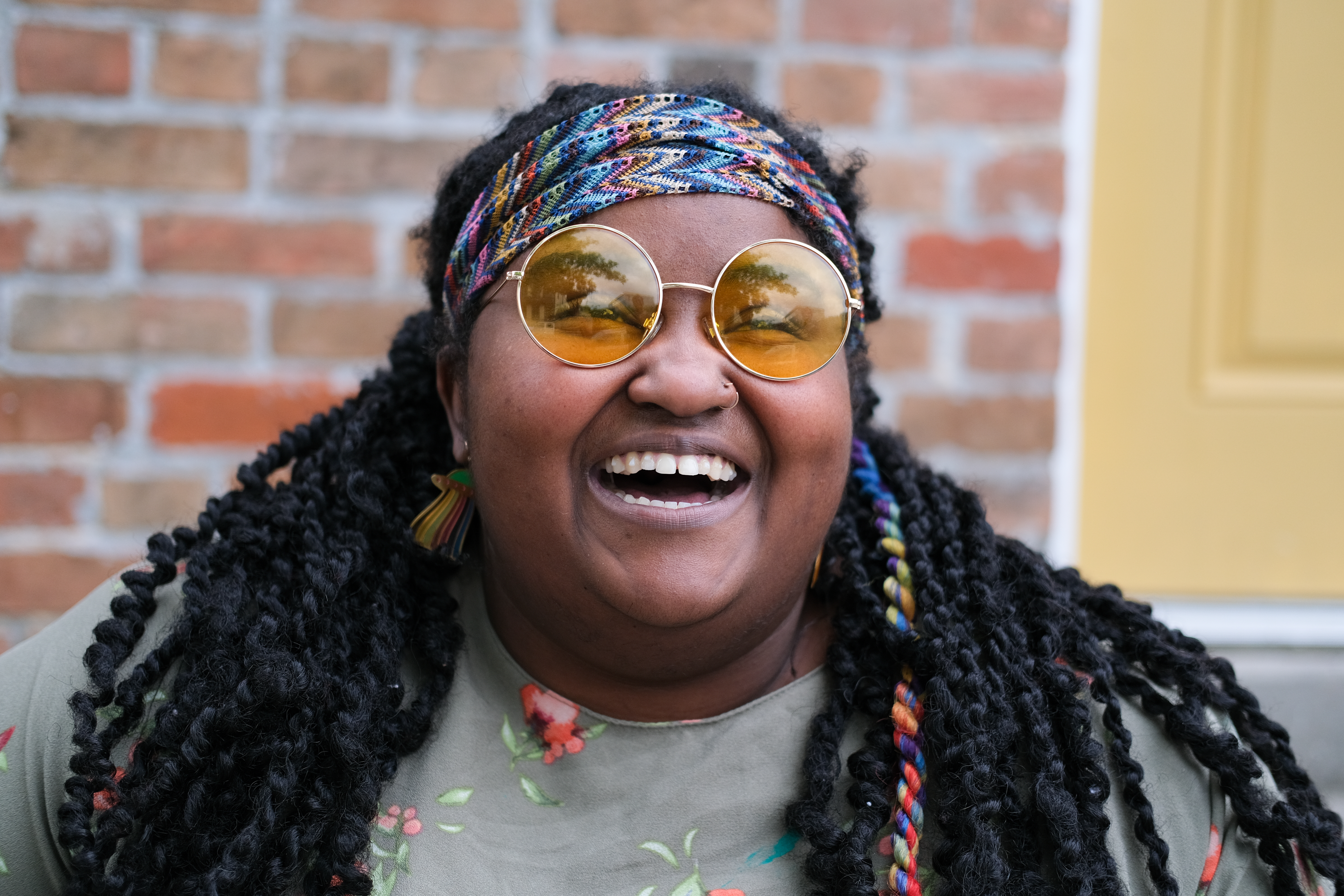‘We would just get up and go.’
Shay, 26 | New Orleans, LA
Shay moved to New Orleans four days before we met her. When her Virginia-based insurance company turned remote, she took her job as an HR data analyst 1,000 miles away. Her neighborhood is filled with colorful, bungalow-style homes that span the shades of the rainbow. Her home’s exterior is plain — brick with a mustard yellow door — but the inside is vibrant. She has a bright red couch, above which rests a mounted moose head, a patterned neon poster, and a maroon arrow with glowing light bulbs around the edges. A pink hammer sits on the back of the couch for artwork she has yet to hang in her new home.
We sit on Shay’s front steps; she’s barefoot and rarely stops smiling. She sometimes refers to herself in the third person as “Shay Shay.” When a Great Dane-Dalmatian Mix passes she bends down and kisses its nose. "Man, it's been a wild life. People say, “Shay, you’re only 26!” I’m like, only? That’s it? I feel like I’ve been here for centuries.”
____
The pandemic put bulimia in my face. Every meal, my Uber Eats bill was just… I think I supported the entire business. I’m serious. Chick-fil-A was my lethal weapon. One night I ate a spicy chicken sandwich, fries, eight chicken nuggets, and I just stuffed it all down. I was in the worst pain of my life. I was convinced I was gonna die. I went to sleep in my earrings and my bra; I got my hair all fixed up, put on a little dress. I thought, “You’re gonna be dead, gotta at least look good.”
I woke up the next day and was like, “Shayla, you have to stop. You literally have to stop or you will die.” I had to look myself in the mirror: “Shay Shay, you have a problem, baby. And you need to fix it.” A month after that, I moved to New Orleans.
I’m the type of person who’s looked at as an emotional support system. But during the pandemic, I couldn't hide behind other people’s problems. Instead of watching everybody else I watched myself. For the first time, I had to emotionally support Shay. The pandemic allowed me to deal with all the pain of my childhood.
My mom is stricken with mental illness and she didn’t know how to handle life. She couldn’t keep a job and had a criminal background. “Do you have a felony? Yes or no?” That’s part of the job application. It's like she was always beat down by the system. My mom just felt stuck. Her “fixing it” was moving around. She had two famous words: let's go.
There were times in my life when it was three o'clock in the morning… oh my god, just dropping everything. All four years of high school, I lived in a shelter. If not in a shelter, then homeless. At one point I told my story to someone in college and she said, “Shayla, you realize you've moved over 40 times?” I was like, “What?” I never counted — we never counted. We would just get up and go, get up and go.
My mom's favorite line to use was “I should have gotten rid of you when I had the chance.” So for a while, when people would express their adorations for me, or love me, I would run away. That was my number one thing to do: run away. I always thought that everyone was lying when they told me that they loved me. I don't like expelling my anger or pain on others. I kept it in. You can't be weak out in the street. Crying’s a sign of weakness, they tell you. I developed ulcers in my childhood because I internalized so much stress.
I didn’t know what to do with my pain. I’d just eat stuff… eat enough and you don't have to feel anything. It's like you’re burying something, right? So food was that covering. I was just looking for dopamine wherever I could get it. The pandemic was the first time where I was like Shay, it’s okay to accept love from people. Not everyone’s a liar. It's important to emotionally process. And it's like, “Shay, I love you.” I call it the “panoramic” instead of calling it the pandemic because it gave me a full perspective on myself.

A map of Virginia, Shay’s homestate, hangs in her living room.
Moving is the first time I did something for me. Ever since then, I recognize when I don't want to eat. And I don't look to food. It’s the peace I’ve been searching for. I realized we are all joy generators, you just got to look hard enough.
I decided to move after our HR office sent out a survey testing how comfortable employees were with returning to the office: 52% wanted to remain at home. I called my boss the same day we got the survey back. I told her that I wanted to work remotely permanently and that I was moving to New Orleans. I figured I'd get the jump start on the crowd. I was like, I'm young. I don’t have any children. Why don't I go remote? So I put in the steps to relocate, claim my spot. And a few weeks later, here we are. Today is Sunday. I moved here Wednesday night. I gave most people three weeks’ notice that I was leaving. Some don't even realize I've left yet.
Most of my friends back home called me crazy, impulsive. “Shayla, you don't know anyone out there. What do you mean you're moving?” [Laughs.] They were like, “You’re being impulsive.” I was like, “Oh, you don't know impulsive. I can show you impulsive.” This was thought out. This was financially considered, you know?
My favorite part about moving here is the colorful houses and the smell of rain. I love rain, the way it melts into you. The people from here are so homey. Everyone I’ve interacted with has treated me as if they’ve been waiting to see me their entire lives. They say, “Welcome home, baby.” That’s been everyone’s response, “Welcome home, baby.” I’m like, oh my god — thank you! Thank you. A lot. A… lot. I guess I am home. Not forever. But for now.
You hear that? [“When the Saints Go Marching In” plays in the distance]. I love that too. There’s live music everywhere. That girl’s carrying a freaking trombone. Ain’t nothing like music. [She hums].

New Orleans, Louisiana
Interview Date: April 18, 2021
